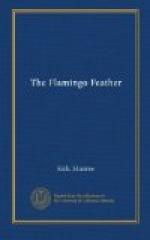In spite of the disfiguration of his face Rene knew him the moment he was dragged within the light of the camp-fire, and it was with sensations of dread and horror that he gazed upon the once familiar features. When he explained to his followers the nature of the weapon this enemy had attempted to use against them, they were filled with rage, and would have instantly slain the wretch, but Rene bade them spare his life.
“I know him,” he said, “and he is too vile a being to be worthy to meet death at your hands. Besides, if he be now released, a lifetime of blindness will prove even a greater punishment than any you can inflict. Lead him far out upon the trail, and there leave him. Others must have accompanied him, and they will doubtless find and care for their own.”
So it was done as Rene had ordered, and on the following day no trace of the wounded man could be found; but the imprint of other moccasined feet, near where he had been left, showed that his friends had discovered and borne him away.
When Rene was afterwards questioned as to who he was, he answered,
“Chitta, the Seminole.”
CHAPTER XVIII
THE FRENCH HAVE COME AGAIN
Three years had passed from the time the Spaniards established their power in this part of the New World, by their fearful massacres of the French at Fort Caroline and among the sand dunes of the coast, below San Augustin. They were years of cruelty and injustice on the part of the Spaniards, and of great suffering to those nations who fell into their hands; but to the dwellers in the distant land of the Alachuas, among whom Rene de Veaux had taken up his abode, they were years of peace, prosperity, and contentment. The little encampment, that the good chief Micco had established beside the great spring, had grown into a populous village, surrounded, in all directions, by broad fields of waving maize and yellow pumpkins, besides an abundance of other things pleasant and useful. The forests still teemed with game, and the rivers with fish, and the skill of the Indian hunter was such that both could be obtained in plenty at all seasons.
In this beautiful land, with every want anticipated, surrounded by devoted friends, and leading a life of active usefulness, it would seem as though no man could be unhappy. There was, however, at least one among its dwellers who was so, and he was their ruler, the chief of them all, whose word was their law, and whose slightest command they hastened to obey. They called him Ta-lah-lo-ko (the White Chief), though in another land he would be known as Rene de Veaux.
It was a great longing to visit once more this other land, the fair France of his birth, and the apparent impossibility of ever doing so, that made the white chief unhappy, and caused his people to regard him sorrowfully, as one troubled by an evil spirit. The old medicine men of the tribe used their most powerful incantations against it, and made charms with which to drive it away; but they did not succeed, because they could not understand it, and did not even know its name, which was “Homesickness.”




